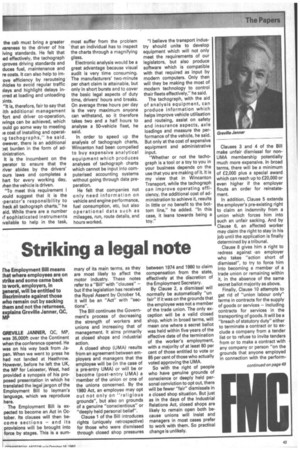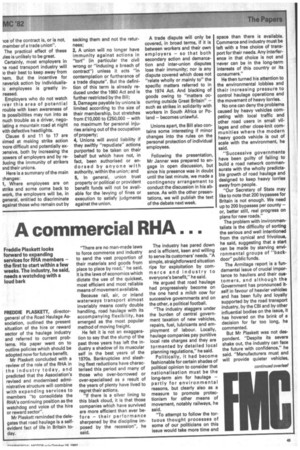Striking a legal note
Page 27

Page 29

If you've noticed an error in this article please click here to report it so we can fix it.
[he Employment Bill means that where employees are on Arike and some came back Lo work, employers, in general, will be entitled to discriminate against those who remain out by sacking them and not the returnees, explains Greville Janner, QC, MP GREVILLE JANNER, QC, MP, was 35,000ft over the Continent when the conference opened. He was on his way back from Japan. When we went to press he had not landed at Heathrow. However, before he left the UK, the MP for Leicester, West, had provided a synopsis of his proposed presentation in which he translated the legal jargon of the Employment Bill to layman's language, which we reproduce here.
The Employment Bill is expected to become an Act in October. Its clauses will then become sections — and its provisions will be brought into force by stages. This is a sum mary of its main terms, as they are most likely to affect the motor industry. These notes refer to a "Bill" with "clauses" — but if the legislation has received the Royal Assent by October 14, it will be an "Act" with "sections".
The Bill continues the Government's process of decreasing the strength of workers and unions and increasing that of management. It aims primarily at closed shops and industrial action.
A closed shop (UMA) results from an agreement between employers and managers that the employee will be (in the case of a pre-entry UMA) or will be or become (post-entry UMA) a member of the union or one of the unions concerned. By the 1980 Act, an employee may opt out not only on "religious grounds", but also on grounds of a genuine "conscientious" or "deeply held personal belief".
Clause 1 of the Bill introduces rights (uniquely retrospective) for those who were dismissed through closed shop pressures between 1974 and 1980 to claim compensation from the state, effectively at the discretion of the Employment Secretary.
By Clause 2, a dismissal will normally be automatically "un fair" if it was on the grounds that the employee was not a member of the trade union. The only exception will be a valid closed shop, which in broad terms, will mean one where a secret ballot was held within five years of the effective date of the termination of the worker's employment, with a majority of at least 80 per cent of those entitled to vote or 85 per cent of those who actually voted approving the UMA.
So with the right of people who have genuine grounds of conscience or deeply held personal conviction to opt out, there will be fewer "fair" dismissals in a closed shop situation. But just as in the days of the Industrial Relations Act, closed shops are likely to remain open both because unions will insist and managers in most cases prefer to work with them. So practical change is unlikely. Clauses 3 and 4 of the Bill make unfair dismissal for nonUMA membership potentially much more expensive. In broad terms, there will be a minimum of £2,000 plus a special award which can reach up to £20,000 or even higher if the employer flouts an order for reinstatement.
In addition, Clause 5 extends the employer's pre-existing right to claim an indemnity from a union which forces him into such an unfair sacking. And by Clause 6, an affected worker may claim the right to stay in his job until the application is finally determined by a tribunal.
Clause 8 gives him a right to redress against ,an employer who takes "action short of dismissal", to try to force him into becoming a member of a trade union or remaining within it, in the absence of the same secret ballot majority as above.
Finally, Clause 10 attempts to get rid of "union labour only" terms in contracts for the supply of goods or services — including contracts for services in the transporting of goods. It will be a "breach of statutory duty" either to terminate a contract or to exclude a company from a tender list or to refuse to invite tenders from or to make a contract with any company or person "on the grounds that anyone employed in connection with the perform ice of the contract is, or is not, member of a trade union".
The practical effect of these Jles is unlikely to be great.
Certainly, most employers in le road transport industry will lo their best to keep away from hem. But the incentive for haverick action by individualisic employees is greatly inceased.
Employers who do not watch iver this area of potential rouble with keen awareness of Is possibilities may run into as nuch trouble as a driver, negoiating a mountain road at night vith defective headlights.
Clause 6 and 11 to 17 are timed at making strike action riore difficult and potentially exmnsive, both by increasing the 3owers of employers and by reJucing the immunity of strikers 3nd their unions.
Here is a summary of the main :hanges: 1, Where employees are on strike and some come back to work, the employers will be, in general, entitled to discriminate against those who remain out by sacking them and not the returnees; 2. A union will no longer have immunity against actions in "tort" (in particular the civil wrong or "inducing a breach of contract") unless it acts "in contemplation or furtherance of a trade dispute". But the definition of this term is already reduced under the 1980 Act and is further restricted by the Bill; 3, Damages payable by unions is limited according to the size of their membership, but stretches from £10,000 to £250,000 — with no maximum for personal injuries arising out of the occupation of property; 4, Unions will avoid liability if they swiftly "repudiate" actions purported to be taken on their behalf but which have not, in fact, been authorised or endorsed by anyone with authority, within the union; and 5, In general, union trust property or political or provident benefit funds will not be available for the levying of fines or execution to satisfy judgments against the union. A trade dispute will only be covered, in broad terms, if it is between workers and their own employers — so that both secondary action and demarcation and inter-union disputes lose their immunity; nor is any dispute covered which does not "relate wholly or mainly to" the specific matters referred to in the 1974 Act. And blacking of goods owing to "matters occurring outside Great Britain" — such as strikes in solidarity with workers in South Africa or Poland — becomes unlawful.
Unions apart, the Bill also contains some interesting if minor changes into the rules on the personal protection of individual employees.
Following the presentation, Mr Janner was prepared to engage in open discussion, but since his presence was in doubt until the last minute, we made a contingency arrangement to conduct the discussion in his absence. As with the other presentations, we will publish the text of the debate next week.




















































































